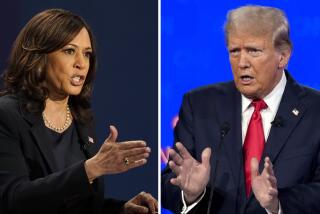2018 in review: From the darkness, uncommon poetry
Poets remind us that even amid the most stubborn gloom there is light, and for those who took notice, 2018 was a year of uncommon poetry.
After a gunman stormed through the corridors of Marjory Stoneman Douglas High School in Florida in February, Emma Gonzalez found words to voice the indignation that she and other students felt over this reoccurring tragedy.
In tears and in rage, she delivered her cri de coeur written on the back of her AP notes.
To the politicians, she shouted, “who sit in their gilded House and Senate seats funded by the NRA telling us nothing could have been done to prevent this, we call BS. They say tougher guns laws do not decrease gun violence. We call BS. They say a good guy with a gun stops a bad guy with a gun. We call BS.”
After the Senate Judiciary Committee voted to advance Brett Kavanaugh’s Supreme Court nomination, sexual-assault survivor Maria Gallagher faced off with Arizona Sen. Jeff Flake, a committee member, as he got into an elevator.
“Don’t look away from me!” she cried. “Look at me and tell me that it doesn’t matter what happened to me.”
A week after Arizona voters took to the polls in the November midterms, Kyrsten Sinema spoke out as the first Democrat since 1988 to capture one of the state’s Senate seats.
“We can work with people who are different than us,” she said. “We can be friends with people who are different than us. We can love and care about people who are different than us.”
In a year that on some days seemed to repeat the past, Americans heard the passion and language that suggested a new direction for the future.
Who could have expected it? 2018 had started much as 2017 had ended.
The White House continued to attract most of the attention of the country. In January, in a meeting with senators over immigration, the president expressed an opinion about Haiti and African states that led some news outlets to dispense with asterisks and reprint the epithet.
Divisions opened up over tariffs on solar panels and washing machines, an unlikely rapprochement with “Rocket Man” Kim Jong-un, an undisclosed face-to-face with Vladimir Putin, and children kept in cages at the border.
Doors kept revolving — Rex Tillerson, Hope Hicks, H.R. McMaster, Scott Pruitt, Jeff Sessions, Nikki Haley — and the Mueller investigation, with 33 people and three companies charged on more than 100 criminal counts, hinted at something far more damning to come.
The headlines arrived each day in a montage of rage and infamy, mea culpas before Congress, corporate shame, crises in Syria and Yemen and meltdowns in England and Europe.
The October showdown over the Supreme Court’s newest justice ended with a near party-line vote and the feeling that this country’s more perfect union was irrevocably broken.
“All Jews must die!” yelled the shooter at the Tree of Life Synagogue in Pittsburgh as he went on a rampage with an AR-15 and three handguns, just one of the 307 — and counting — mass shootings of 2018, including the terror that unfolded in Thousand Oaksless than two weeks later.
A onetime body builder, pizza driver and male dancer sent mail bombs to critics of the president, who had equivocated over Saudi Arabia’s responsibility for the murder of journalist Jamal Khashoggi, who posthumously warned about “the influence of nationalist governments spreading hate through propaganda.”
Yet amid the darkness came intimations of change.
Generation Z stepped out of the shadows of millennials. #MeToo was joined by Time’s Up, and educators, wearing red and declaring “Teachers Make America Great,” took to the streets in Arizona, Colorado, Oklahoma, Kentucky and West Virginia to protest stagnant wages and funding cuts.
In November, more than 113 million people took to the polls, an unprecedented number for a midterm election.
Activism, the passion of a few, had become engagement, the commitment of many. In a rising chorus, decency was demanded and pretension was decried, and possibilities revealed themselves not just in grand and sweeping terms but in gestures small and elegantly subversive.
“Black Panther,” whose hero came from a fictional African state, allowed a victory lap for creator Stan Lee, who died last month and who had called bigotry and racism “the deadliest social ills plaguing the world today.”
In the season finale of “The Walking Dead,” zombie killer and grieving father Rick Grimes offered mercy to his nemesis, Negan, and when the gavel came down on Banksy’s “Girl with Balloon” for $1.4 million, a shredder built into the frame of the spray-painted canvas started to roll, a commentary on both inflated values and the ephemera of life.
Some actions are louder than words.
After a fatal collision on the 105 Freeway blocked all westbound lanes, the operator of a taco truck stuck in the gridlock started selling breakfast burritos to motorists, at half price as some reported.
“I never thought something like this would happen,” said Isabel Larios, who had run the food truck since 1986.
Businesses and governments joined a widening ban on plastic stirrers and straws, and Gov. Jerry Brown switched up the rhetoric over the state’s recurring wildfires. “The new normal” became “the new abnormal,” suggesting such devastation needn’t be accepted.
At the United Nations’ climate change summit, David Attenborough stood up as well.
“If we don’t take action, the collapse of our civilizations and the extinction of much of the natural world is on the horizon,” he said. “Leaders of the world, you must lead. The continuation of our civilizations and the natural world upon which we depend is in your hands.”
Straight talk showed its enduring ability to inspire, even when it came from beyond the grave.
“We weaken our greatness when we confuse our patriotism with tribal rivalries that have sown resentment and hatred and violence in all the corners of the globe,” Sen. John McCain wrote in a letter to all Americans, released two days after his death.
His passing proved that complicated, even disputed legacies are worth reevaluating.
“America is never wholly herself unless she is engaged in high moral principle,” said George H.W. Bush in 1989, words that took on a brighter light after his death in November. “We as a people have such a purpose today. It is to make kinder the face of the nation and gentler the face of the world.”
Memory often confers an air of innocence to the past. Authenticity is more difficult to evoke unless its utterance is spontaneous and raw.
When Dodgers infielder Max Muncy connected with the 90-mph cutter in the 18th inning of Game 3 of the World Series, the crowd held its breath.
“Muncy flies one in the air to left center, back at the wall, and it’s gooooone!” announcer Joe Buck said.
Los Angeles let loose in wonder and disbelief at the conclusion of the seven-hour, 20-minute duel against the Boston Red Sox.
When the spacecraft InSight neared the end of its 300-million-mile journey to Mars after Thanksgiving, the tension at the Jet Propulsion Laboratory in La Cañada Flintridge was inescapable.
“Thirty-seven meters. Thirty meters. Twenty meters. Seventeen meters,” intoned engineer Christine Szalai during the final seconds of the six-month mission.
Then silence — too long for many — before she spoke again.
“Touchdown confirmed.”
Seldom do the scientists and engineers let their inner 4-year-olds out, but they did then, and minutes later gazed upon the first image relayed to Earth, an up-close portrait, speckled with dust, of the red planet’s fractured plain.
“There’s a quiet beauty here. Looking forward to exploring my new home,” @NASAInSight tweeted.
In darkness, poetry and light.
Twitter: @tcurwen
More to Read
Sign up for Essential California
The most important California stories and recommendations in your inbox every morning.
You may occasionally receive promotional content from the Los Angeles Times.











